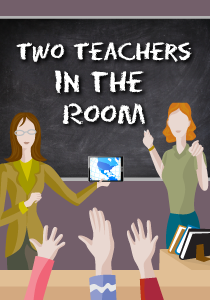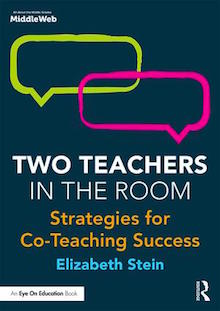Solve the Challenges of Coteaching Relationships
A MiddleWeb Blog
 Another school year is upon us! The question is: Co-teachers, what are you going to do with this fresh start of boundless potential?
Another school year is upon us! The question is: Co-teachers, what are you going to do with this fresh start of boundless potential?
The first step, I say, is to confront the obvious co-teaching challenges. Just put it all out there! And I am here to do it with you.
For your convenience, I have narrowed down all (yes, I really mean all!) co-teaching challenges into two categories (Stein, 2016):
►Instruction
►Communication
Within these two categories, I claim, fall the every day challenges we all know and need to breathe through. Placing our challenges into these categories serves to provide a “Hey! I can do this!” mindset as challenges are translated into manageable, solution-seeking (and finding) action steps.
This post is the first of a three-part sequence. It introduces a recipe for success for any co-teaching pairing. Yes, you read correctly—any pairing—so keep reading. There’s plenty here to get you started!
Let’s begin this conversation with a bold “say it like it is” mindset. Let’s make a vow to face the challenges of co-teaching head on—at the very beginning—so we may spend the rest of this school year working toward solutions rather than risking a wallow in a woe-is-me, status quo default relationship.
So, let’s do this. Let’s make this year—your year—a year filled with the most powerfully positive co-teaching experiences yet!
What will this three-part posting sequence look like? This week’s post in on the foundational relationship piece that must, must, must be in place (it falls into that communication category). October’s post will be about going beyond the co-teaching models through some electrifying instructional decisions. And November’s post will be around co-creating a synergetic assessment cycle guaranteed to inform instruction, the co-teaching relationship, and just plain powerful learning for everyone.
Relationships as the Foundation

So as you begin this fresh start to a new school year, ponder these stages and decide where you presently reside—then decide where you would like to be in one month, two months, three months…and so on (taking one month at a time). The key is to embrace where you are right now and channel all your efforts into accepting it and deciding your actions for co-creating harmonious relationships.
The Three Stages (p.3):
Beginning Stage: One or both co-teachers are guarded and maintain surface level communication.
Compromising Stage: Both teachers have committed to an ongoing open communication practice. Both teachers are active in the planning, instructional, and assessment phases of co-teaching. Trust is evident through cooperation.
Collaborative Stage: Cue the music! This is the ultimate goal! Cooperation moves to the level of collaboration with a high comfort level, as both teachers are free to express their expertise for all learning experiences throughout each day.
The process of moving through these stages cannot be forced; it must be embraced, accepted, and respected. Whatever stage you are at—take a deep breath and realize this is the place to be for the time being. But who wants to stay on a treadmill for ten months of the year?
Tips to Move from Stage to Stage

1. Form Meaningful Connections: Seek out the colleague(s) who could offer progressive support. Never allow yourself to get caught in the complaining cycle of what is not working. Focus on what is working—and seek resources to expand the positive aspects of your relationship. How do you make the next thing work?
2. Stay Strategically Persistent: It’s just way too easy to fall into the status quo and feel helpless—but the good news is, you’ve got this! Enter a resilient mode and make that your default. Assume a strengths-based perspective for those times of frustration. It’s a matter of accepting any situation and deciding what is the one small or grand thing you could do personally today to empower the learning for everyone in your classroom.
3. Go Google! It’s important to maintain daily communication—in person. Yet, our busy schedules often act as a time vacuum—and we fall into the trap of saying “We just don’t have time…to plan…to share…to brainstorm…to find a solution.” Don’t let that happen to you! Explore and implement all of the possibilities for setting the stage and expanding all your communications via the Cloud using Google tools.
From co-planning to debriefing to maintaining an ongoing dialogue, there’s a tool to help you and your co-teacher optimize your verbal and nonverbal skills, and allow the interpersonal skills mentioned earlier in this post to skyrocket! You will truly find your in-person connections amplified through your asynchronous collaborations. Go, team, go!
Grow Your Co-teaching Relationship
Whether you are well into the launch of this school year or just beginning, give the three stages of co-teaching a glance and decide where you live right now. What is working well and what needs to improve? Keep in mind every co-teaching relationship has room for growth. So are you ready to resolve any co-teaching challenge through cultivating your relationship? Let’s do this!
Cited: Stein, E. (2016) Elevating co-teaching through udl. Wakefield, MA: CAST
____________________



































